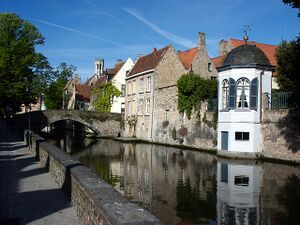The aim of this page is to recognise, celebrate and encourage the self-empowerment of community agency networks (CANs) and community groups across Belgium.

 ‘We can live again’: Belgian nursing home residents hit the nightclubs, theguardian.com (May 02, 2024)
‘We can live again’: Belgian nursing home residents hit the nightclubs, theguardian.com (May 02, 2024)  Belgian court orders 55% emissions cut from 1990 levels, theguardian.com (Dec 01, 2023)
Belgian court orders 55% emissions cut from 1990 levels, theguardian.com (Dec 01, 2023)  Brussels launches permanent citizens’ assembly on climate, knoca.eu (Nov 17, 2022)
Brussels launches permanent citizens’ assembly on climate, knoca.eu (Nov 17, 2022)
Networks and sustainability initiatives[edit | edit source]
- Citizens Spring, citizen movement "to rebuild our local communities to be more resilient. Our goal is to develop and support various citizen initiatives that bring citizens together and that focus on sustainable solutions."
- Liege in Transition
- Transitie Tervuren
Resources
Youth initiatives[edit | edit source]
Young Green (Dutch: Jong Groen) is the youth organisation of Groen, the Green party in Flanders and Brussels.
Visions[edit | edit source]
Community involvement[edit | edit source]
- G1000, Belgian platform for democratic innovation. "We develop and support new forms of citizen participation. We are active in municipalities, cities, regions and on national level. We are also involved in various international networks." added 15:10, 17 November 2022 (UTC)
Community energy[edit | edit source]
Climate action[edit | edit source]
Ethical consumerism[edit | edit source]
Food activism[edit | edit source]
- Ceinture Aliment-Terre liégoise - (fr, nl, de)
- www.fian.be, Foodfirst Information & Action Network
- PermaFungi
Reduce, reuse, repair and recycle[edit | edit source]
- RREUSE represents social enterprises active in re-use, repair and recycling
Events[edit | edit source]
- Repair Cafés, Repair Together
Sharing[edit | edit source]
Past events[edit | edit source]
2019
Mar 21 - 24 Citizen Spring
2016
Sep 18 Car Free Sunday in Brussels
About Belgium[edit | edit source]
Belgium, officially the Kingdom of Belgium, is a country in Northwestern Europe. The country is bordered by the Netherlands to the north, Germany to the east, Luxembourg to the southeast, France to the south, and the North Sea to the west. It covers an area of 30,689 km2 (11,849 sq mi) and has a population of more than 11.5 million, making it the 22nd most densely populated country in the world and the 6th most densely populated country in Europe, with a density of 376/km2 (970/sq mi). Belgium is part of an area known as the Low Countries, historically a somewhat larger region than the Benelux group of states, as it also included parts of northern France. The capital and largest metropolitan region is Brussels; other major cities are Antwerp, Ghent, Charleroi, Liège, Bruges, Namur, and Leuven.
Belgium is a sovereign state and a federal constitutional monarchy with a parliamentary system. Its institutional organization is complex and is structured on both regional and linguistic grounds. It is divided into three highly autonomous regions: the Flemish Region (Flanders) in the north, the Walloon Region (Wallonia) in the south, and the Brussels-Capital Region. Brussels is the smallest and most densely populated region, as well as the richest region in terms of GDP per capita. Belgium is also home to two main linguistic communities: the Flemish Community, which constitutes about 60 percent of the population, and the French Community, which constitutes about 40 percent of the population. A small German-speaking Community, making up around one percent of the population, exists in the East Cantons. The Brussels-Capital Region is officially bilingual in French and Dutch, although French is the majority language and lingua franca. Belgium's linguistic diversity and related political conflicts are reflected in its complex system of governance, made up of six different governments.
Near you[edit | edit source]
External links
- Brussels Environment, administration of the environment and the energy of the Region of Brussels-Capital

